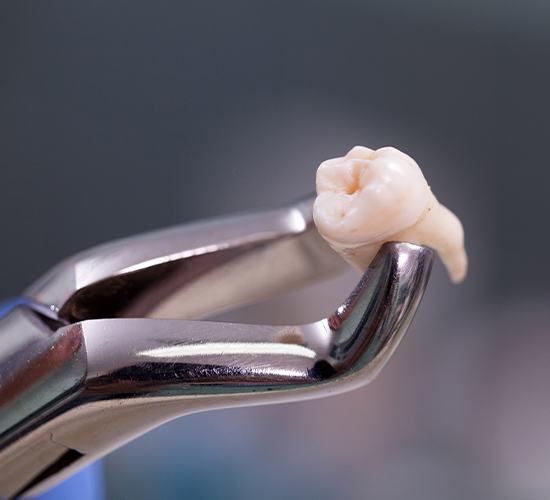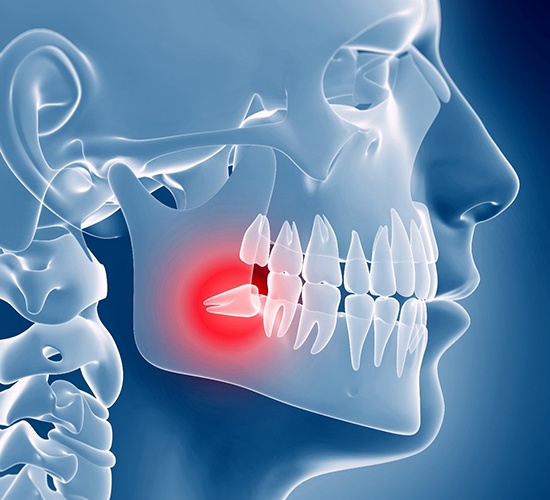Rockledge Wisdom Teeth Extractions
We Take Care of Hurting Wisdom Teeth
During the late teen years into early adulthood, the final set of teeth grow in. These third molars, commonly called the wisdom teeth, were useful at one point in history because tooth loss was extremely common. Now, people often don’t need these extra teeth. In fact, wisdom teeth can actually cause serious problems and unpleasant symptoms, which is why they are often removed altogether. If you have wisdom teeth giving you trouble, contact us and schedule an appointment with Dr. Kumar.

Why Choose Premier Walk-In Dental for Wisdom Teeth Extractions?
- Same-Day Extractions Available
- Walk-In Patients Welcome
- Dental Insurance Maximized
Reasons for Wisdom Tooth Extraction

In the following circumstances, or if the probability of one of these situations is high, Dr. Kumar may recommend a wisdom tooth extraction:
- There is not enough room in your mouth for these teeth.
- The wisdom teeth are erupting at an angle, which can cause infections and tooth pain.
- Your other teeth are being pushed out of position, leading to excessive enamel wear and jaw pain.
Regardless of the reasons for your extraction, you can rely on our team to ensure your comfort from beginning to end.
The Wisdom Tooth Extraction Process

Each wisdom tooth extraction is unique, and Dr. Kumar will customize your procedure based on your needs. However, the general process is fairly simple. We will first administer a local anesthetic to completely numb the mouth. Our team will make sure that you are completely comfortable before we begin the procedure. Depending on how your wisdom teeth are positioned, Dr. Kumar will either make a small incision and remove the teeth or gently use instruments to extract them.
Aftercare Tips

Once we’ve completed the extraction, the healing process can begin. At this point, it’s crucial that you follow our instructions so that you can avoid painful complications, such as a dry socket. Here are some guidelines for healing properly after your wisdom tooth extraction:
- Keep clean gauze on the surgical site for several hours and allow a blood clot to form.
- Do not use a straw or smoke cigarettes for at least 48 hours. The sucking motion could dislodge the clot.
- Take pain medication to reduce your discomfort.
- Apply a cold compress to minimize swelling.
- Refrain from strenuous activities for a few days and get plenty of rest.
Understanding the Cost of Tooth Extractions

There isn’t a set price for wisdom tooth removal because there are several factors that can influence the cost, including the state of your wisdom teeth, your dental insurance coverage, and how many wisdom teeth you’re having removed. Fortunately, that doesn’t mean the price has to be a surprise. When you visit us for a consultation, we’ll consider all these variables to provide a custom estimate of how much you can expect to pay. Read on as we cover some important information about the cost of wisdom tooth removal in Rockledge.
Factors That Can Affect Wisdom Tooth Extraction Cost

It’s incredibly difficult to determine the precise cost of wisdom tooth removal until our team has evaluated the condition of the teeth in question. While crafting your custom estimate, we’ll be looking at variables like:
- Complexity of the procedure: Fully erupted wisdom teeth are the least expensive to treat, but they are also the rarest. The procedure becomes more complex and expensive if the tooth is still underneath the soft tissues, and even more so if it’s trapped in the jawbone.
- Number of teeth to be extracted: The maximum number of wisdom teeth a person can have is four, but many patients develop fewer. Naturally, the more wisdom teeth that need to be extracted, the higher the cost.
- The need for a specialist: Surgical extractions will need to be completed by a trained oral surgeon, who will incur a separate cost from your main dentist.
- Your age: Generally speaking, it is oftentimes more cost-effective to have wisdom teeth removed early in life, before they have fully developed, rather than later in life, when they are more likely to be impacted.
Does Dental Insurance Cover Wisdom Tooth Extractions?

Most dental insurance companies offer some form of coverage for wisdom teeth removal. However, it’s important to remember that every dental insurance policy is different, so you’ll need to check with your provider to fully understand your coverage. Plus, you’ll also need to consider your deductible, annual maximum, and co-pay to predict how much you’ll need to pay out of pocket. However, in most cases, dental insurance will cover wisdom tooth extraction by 50-80%.
Other Options for Making Wisdom Tooth Extractions Affordable

In addition to accepting dental insurance, we can help our patients make wisdom tooth extraction more affordable with flexible financing through CareCredit. This third-party company offers qualifying patients a variety of payment plans to choose from. With low or no interest rates, you’ll be sure to find a payment plan that fits into your budget. With CareCredit financing, you can choose to spread out the cost of your wisdom tooth removal over the next several months or years. Our knowledgeable team would be happy to further explain your payment options, or you can apply for CareCredit on our website.
Wisdom Teeth FAQs

Many people end up having their wisdom teeth removed at some point. When the time comes for your own wisdom teeth to erupt, you’re likely to have a few questions, which Dr. Kumar will be more than happy to answer for you. Below, we’ve answered several of the questions that we’ve often heard from our patients in the past; before you call our office, see if we’ve already addressed your concerns here.
How Many Wisdom Teeth Will I Have?
Most people have four wisdom teeth. However, this is not always the case, as some people only have one to three wisdom teeth while others have five or six. And in very rare cases, some people never get wisdom teeth at all! To determine the exact number of wisdom teeth in your jaw before they erupt, we’ll need to take an X-ray of your mouth. The extraction process will be carefully planned out based on the number of wisdom teeth found.
Do Wisdom Teeth Always Have to Be Removed?
Wisdom tooth extractions are so common that some see them as a rite of passage for teenagers and young adults. Despite this, the procedure isn’t always required. Sometimes the wisdom teeth can erupt normally and fit neatly into your mouth alongside the other teeth. You can keep a properly erupted wisdom tooth that isn’t causing notable oral health issues as long as you’re consistently able to keep it clean.
With that being said, removing wisdom teeth is usually the best course of action if they are actively causing pain or are set to erupt in a way that could damage your other teeth. We’ll decide whether to recommend an extraction based on what’s best for your oral health at the time.
How Long Does Wisdom Tooth Extraction Normally Take?
Some teeth are more difficult to remove than others, and of course the number of wisdom teeth must be considered as well. Most wisdom tooth extractions take one or more hours to complete. Note that it’s typically recommended that you rest for at least 24 hours after wisdom tooth removal, so plan your schedule accordingly.
Will Wisdom Tooth Extraction Hurt?
The first step of the extraction process is to use a local anesthetic to numb your mouth. This means you should not experience pain or discomfort while we remove your wisdom teeth. After the procedure is complete and the anesthetic wears off, you may experience some mild discomfort, which normally lasts for a few days or up to a week. Prescription or over-the-counter pain relievers can help make you more comfortable. It may also help to use ice packs during the first couple of days. The pain shouldn’t turn severe or last longer than the expected week. If it does, call us immediately; you might be experiencing a dry socket or some other problem that’s affecting the healing process.

